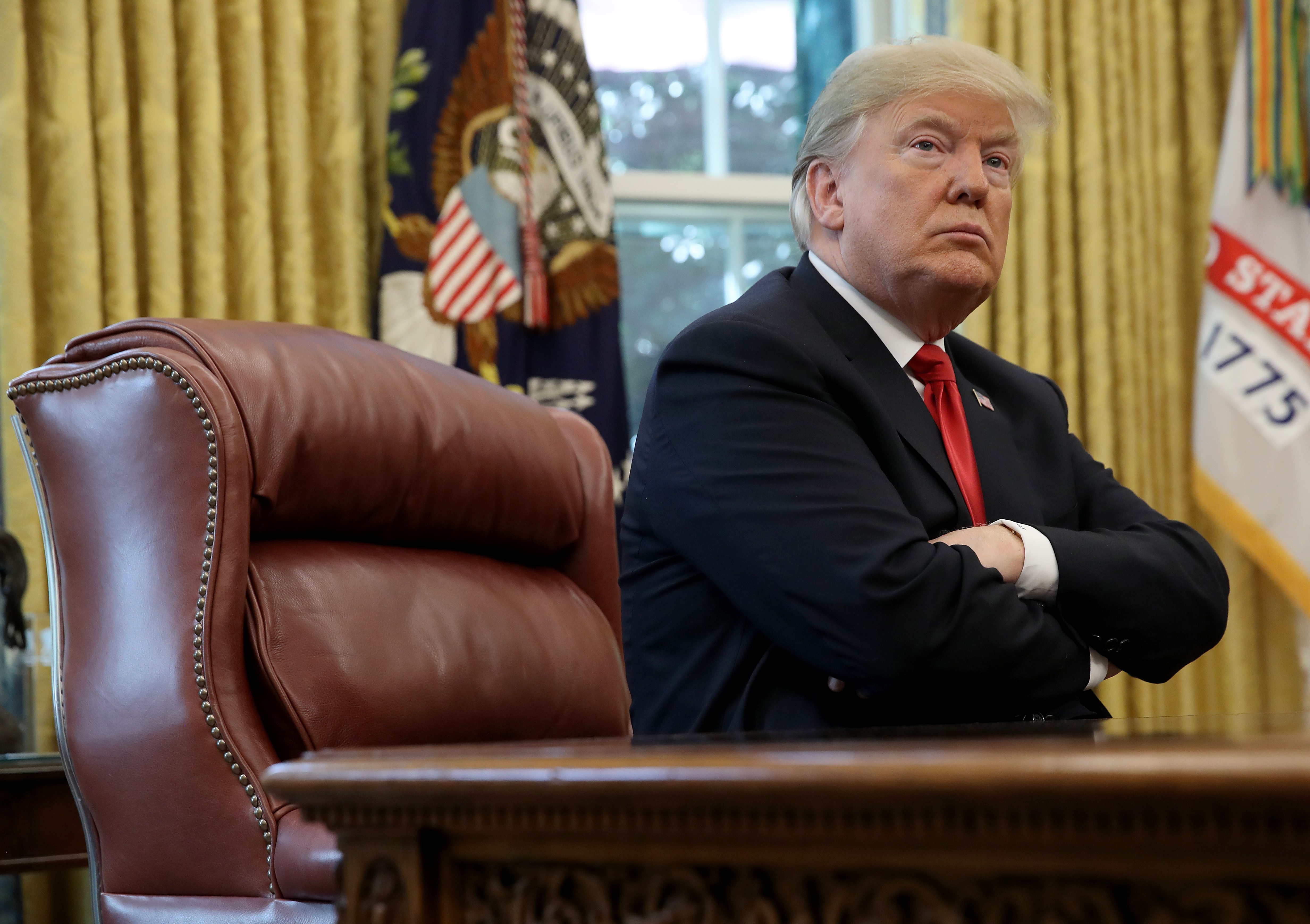Trump has the government teetering on the edge of chaos. Is anyone surprised?
Trump was elected, in part, to disrupt Washington. Be careful what you wish for.


In the 21st century tech era, "disruption" has become a buzzword. We've been trained to think of disruption as unambiguously positive — messy, maybe, but always done in the service of upending staid and outdated approaches best left behind. Reality, though, is more complex: Disruption can have good or bad consequences; often, it's a mix of both. Disruption is often painful, and the people who feel the most pain are usually not the instigators of the chaos. If done for its own sake, without a larger vision to guide, the forces of disruption can be likened to a toddler knocking over a pile of blocks just to see what happens — briefly interesting, but ultimately kind of pointless.
That brings us, naturally, to President Trump.
The United States has reached a moment of high, extreme disruption: a stock market in free fall, a government poised to shut down, and a national security establishment in uproar. Each of these developments is at least partly the result of the president's actions: The already-nervous markets are being made even more jittery by the ongoing budget fight. That fight seems likely to lead to a shutdown since Trump, under pressure from his right wing, has announced he won't sign a budget bill that doesn't include his border wall funding. And Defense Secretary Jim Mattis resigned in protest over the president's decision to withdraw U.S. troops from Syria.
The Week
Escape your echo chamber. Get the facts behind the news, plus analysis from multiple perspectives.

Sign up for The Week's Free Newsletters
From our morning news briefing to a weekly Good News Newsletter, get the best of The Week delivered directly to your inbox.
From our morning news briefing to a weekly Good News Newsletter, get the best of The Week delivered directly to your inbox.
All of this, and Special Counsel Robert Mueller is still lurking out there, somewhere.
We were promised that America would be made greater. Instead it seems like the country and its governance are teetering on the edge of chaos.
That Trump's presidency has arrived at this fulcrum wasn't just predictable — it was kind of the point. When his candidacy gained steam during the early weeks and months of 2016, some supposedly smart conservatives hopped on board the bandwagon quickly and, seemingly, a bit cynically: They didn't think Trump was a good man or a smart man, necessarily. But they looked at what the elite establishment had created over the previous 15 years — America was trapped in unending wars abroad, the economy at home was sluggish even in recovery — and decided that Washington's pile of blocks needed a good toppling.
Besides, what were they going to do — vote for Hillary Clinton?
A free daily email with the biggest news stories of the day – and the best features from TheWeek.com
This logic was most memorably — and nihilistically — demonstrated in "The Flight 93 Election," published two months ahead of Trump's upset victory. "A Hillary Clinton presidency is Russian Roulette with a semi-auto," wrote Michael Anton, who went on to serve on Trump's National Security Council. "With Trump, at least you can spin the cylinder and take your chances."
Read that paragraph again. It likens a vote for Trump to the probability of shooting oneself in the head. And that was the case for his presidency.
Disruption was the rationale for Trump; it may also be all he's actually capable of doing. For all his stagecrafted reputation as a developer and dealmaker, the president doesn't seem capable of actually building or creating anything. (His private-sector bankruptcies, failed ventures, and lawsuits should've been red flags here.) Trump makes no attempt to persuade, believing he can bluff and bully his way to victory.
Most of the time, he can't. The result is that Trump can only break things; the adults are left to try to distract him from the valuables and hope the rest can be repaired or replaced with ease.
This presidency is thus characterized by several factors: Trump's apparent unwillingness or inability to understand why things are the way they are in the first place; an often-wrongheaded belief that "different" is automatically "better"; his disregard of possible downsides to his actions — some decisions will have impossibly hard tradeoffs no matter what; and an impulsive decision-making style that alienates the very people who are supposed to carry out his orders. These characteristics link his actions on the border wall, the "Muslim ban," the trade war with China, and more.
Even when Trump has a potentially good idea, he executes it badly. For example, there are reasons to think America's continued involvement in Syria and Afghanistan actually isn't helpful or to the nation's ultimate advantage. Trump might've softened the blow by making a deal with Turkey to protect America's Kurdish allies there. Instead, he almost impetuously tweeted his withdrawal announcement, and a day later, Mattis resigned in disgust.
We'll see if the market is ready to recover or if stocks will keep falling. It's likely that a good portion of the government will shut down. Abroad, America's allies will spend the weekend wondering if there's anybody left in the executive branch to advocate for the country's alliances.
This is a crazy, scary, disruptive moment — which means the Trump presidency is working out precisely as designed.
Joel Mathis is a writer with 30 years of newspaper and online journalism experience. His work also regularly appears in National Geographic and The Kansas City Star. His awards include best online commentary at the Online News Association and (twice) at the City and Regional Magazine Association.
-
 Why is Trump’s alleged strike on Venezuela shrouded in so much secrecy?
Why is Trump’s alleged strike on Venezuela shrouded in so much secrecy?TODAY'S BIG QUESTION Trump’s comments have raised more questions than answers about what his administration is doing in the Southern Hemisphere
-
 Vance’s ‘next move will reveal whether the conservative movement can move past Trump’
Vance’s ‘next move will reveal whether the conservative movement can move past Trump’Instant Opinion Opinion, comment and editorials of the day
-
 Why recognizing Somaliland is so risky for Israel
Why recognizing Somaliland is so risky for IsraelTHE EXPLAINER By wading into one of North Africa’s most fraught political schisms, the Netanyahu government risks further international isolation
-
 Bari Weiss’ ‘60 Minutes’ scandal is about more than one report
Bari Weiss’ ‘60 Minutes’ scandal is about more than one reportIN THE SPOTLIGHT By blocking an approved segment on a controversial prison holding US deportees in El Salvador, the editor-in-chief of CBS News has become the main story
-
 Has Zohran Mamdani shown the Democrats how to win again?
Has Zohran Mamdani shown the Democrats how to win again?Today’s Big Question New York City mayoral election touted as victory for left-wing populists but moderate centrist wins elsewhere present more complex path for Democratic Party
-
 Millions turn out for anti-Trump ‘No Kings’ rallies
Millions turn out for anti-Trump ‘No Kings’ ralliesSpeed Read An estimated 7 million people participated, 2 million more than at the first ‘No Kings’ protest in June
-
 Ghislaine Maxwell: angling for a Trump pardon
Ghislaine Maxwell: angling for a Trump pardonTalking Point Convicted sex trafficker's testimony could shed new light on president's links to Jeffrey Epstein
-
 The last words and final moments of 40 presidents
The last words and final moments of 40 presidentsThe Explainer Some are eloquent quotes worthy of the holders of the highest office in the nation, and others... aren't
-
 The JFK files: the truth at last?
The JFK files: the truth at last?In The Spotlight More than 64,000 previously classified documents relating the 1963 assassination of John F. Kennedy have been released by the Trump administration
-
 'Seriously, not literally': how should the world take Donald Trump?
'Seriously, not literally': how should the world take Donald Trump?Today's big question White House rhetoric and reality look likely to become increasingly blurred
-
 Will Trump's 'madman' strategy pay off?
Will Trump's 'madman' strategy pay off?Today's Big Question Incoming US president likes to seem unpredictable but, this time round, world leaders could be wise to his playbook
